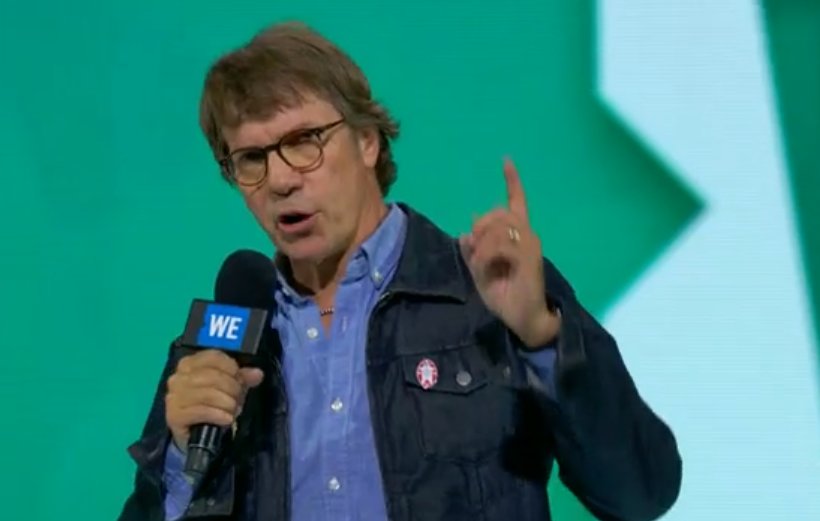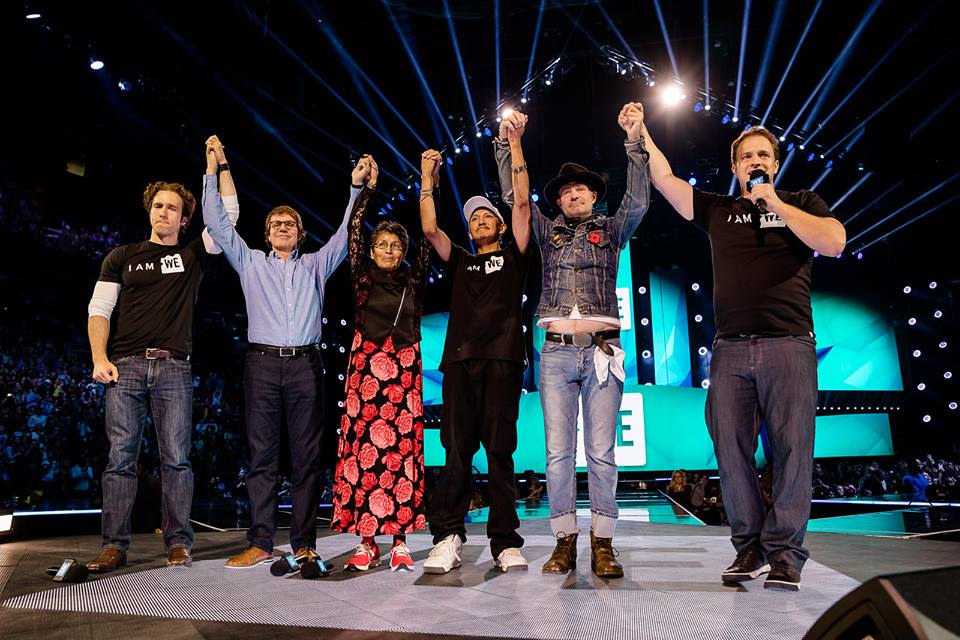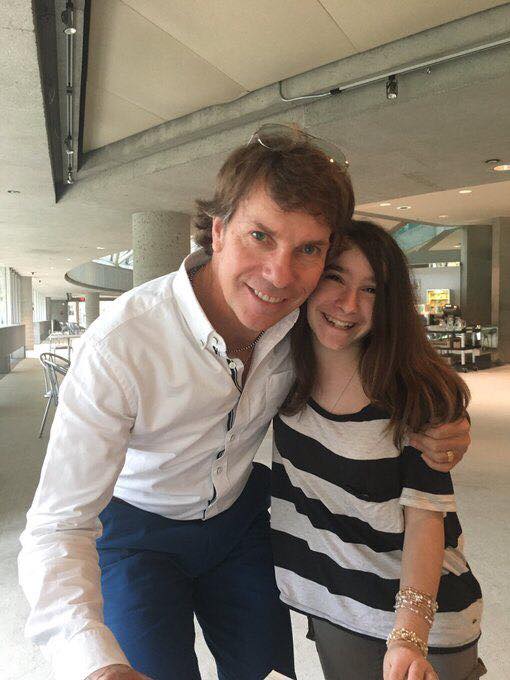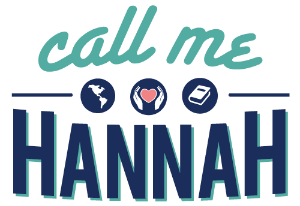WE Day Toronto was last week and it was amazing! There were so many inspiring speakers and performers that made the day awesome for the 20,000 change makers that filled the Air Canada Centre. It was my 26th WE Day and there was a moment that was, without doubt, the most powerful moment I’ve experienced in all of the WE Day events I’ve participated in.
Gord Downie was a special guest at WE Day Toronto. He wanted to be there to share his message with us. The story of Gord’s message and what is driving him right now fit so well with the WE Day audience. The story of how it started for him is so similar to those of us who know Craig Kielburger’s story and what has become WE. A few years ago Gord read an article that had been published in Macleans magazine in 1967, The Lonely Death of Chanie Wenjack, Chanie was 12-years-old when he died. Craig also read an article about a 12-year-old boy who died – Iqbal Masih. Both Gord and Craig were moved to learn more about these boys and bring their stories and the issues around their deaths to the world. Those of us at WE Day understood this and the call to action that comes with learning.
After reading that article, Gord wrote a series of poems that are now the album called Secret Path that was co-written and produced by Kevin Drew and David Hamelin. There is also an illustrated book that he and Jeff Lemire wrote to tell Chanie Wenjack’s story. Chanie escaped from a residential school and tried to make it back home – 400 miles away. He was found dead 8 days later. It was fifty years ago today, on October 22, 1966.
He ran away because this government-funded school was like a prison. The families in indigenous communities were tricked into thinking that this was a good choice for kids with the Canadian government and church claiming these schools were much better than the city-based ones. What they ended up doing was ripping the kids apart from their families and their homes. Essentially, this action devastated and damaged the indigenous people still to this day.
In light of Gord’s album, book and the animated film Secret Path (airing tonight at 9pm on CBC) I had the opportunity to sit down with Mike Downie. Mike is Gord’s brother, producer of the album and film, and works alongside Gord on this project. I asked my first question which lead to a 10-minute answer and more than I have been taught about this issue in school. What was it like for you to be at WE Day with 20,000 youth in that stadium talking about the Secret Path?

Photo Credit: WE Day
Mike:
I’m still processing it. It was really an important moment for me. I’m pretty good around the family dinner to make a toast and things like that, but I’ve never been in front of that many people before. I’ve been with those people many times, often watching my brother, so I knew that end of it pretty well. But I never had that opportunity before and I just have such a strong belief that we’re doing something really important right now. I feel lucky that this has happened. It took three years for Gord and I to get to that stage.
But I feel like something’s really happening for me that I’ve never really experienced before. I’m dedicated to many things. I’m dedicated to my big family, I have five children, I’ve got a career as a documentary filmmaker. I’ve never had something come along that’s just shaken me up so much since Gord, my brother Patrick and I went up to meet Pearl for the first time. We’d been talking for several years about the project, she knew about it, but she hadn’t seen anything. My brothers and I went up there and we have to come up with a new expression, but it was a life changing experience. Ever since then, I don’t sleep very well. It’s now been over a month, I’m not complaining, but everything’s changed for me. I relax, but I have this agitation.
Part of it has to do with this project, the kind of stress and pressure. Another part of it is I feel like I’m a big believer in transformation among individuals. I really feel like you’re not just stuck with who you are, and I’ve changed a few times over my life and it’s always been for the better. I used to call it my ceremonial bridge burning. I get to a point in my life and I just feel like, you know, for a really good reason, I just feel stalled out and I don’t know the way forward. At that moment, in my mind, I light the matches, turn around and light that wooden bridge behind me and say goodbye and start over again. Now remember, this is not a makeover, this is a way to reinvent yourself and that’s what happening to me right now. I’ve reinvented myself, I’m still the same guy, I’m still the same husband, I’m still the same brother, but my core values have been given a new focus and that’s changed everything for me.
I’m okay with not sleeping at night, there’s lots to read about these issues. I’m reading several amazing books, and when I say amazing, a lot of it is depressing. But it’s amazing in that you go “Didn’t know that, didn’t know that, didn’t know that” about my own country. I’ve always been interested in my country, I’ve always been interested in the world. As a documentary filmmaker, I get to go everywhere. I’ve been to a lot of places that are hard to get to. You know, even working on this project, it wasn’t until I went up to meet Pearl’s family that the whole thing, the penny dropped as they say. Ever since then, I question almost everything about this country.
I believe in this country, I just believe that there’s so much more that we can do.
I believe in this country, I just believe that there’s so much more that we can do. I think that in this country called Canada that I love, I think we missed a really big opportunity. I think we have the solution. It’s to embrace indigenous people and their ways of life. We try to wipe it out but the residential school story is from the last 130 years. It didn’t work. It did a lot of damage to individuals, damaged families, damaged communities. The issues you see in the indigenous population are almost all the result of residential schools. These kids were not raised by their parents.
Hannah, you’re 13. That’s when kids were going to residential school for 10 months of the year.
Hannah, you’re 13. That’s when kids were going to residential school for 10 months of the year. It wasn’t a school, it was a prison for kids who had done nothing wrong. It’s sort of like one of those horror books and it’s meant to scare the hell out of you and in our case, it was a nationally government sponsored program that ran from 1883 to 1996.
I always thought we were privileged to grow up in Canada and we are. It’s just that a lot of people have paid a price for that privilege so I think we’re going to change that.
I always thought we were privileged to grow up in Canada and we are. It’s just that a lot of people have paid a price for that privilege so I think we’re going to change that. There are over 200 communities that don’t have a water advisory but they’ve only had it for a couple of decades but we’re getting to it. It’s kinda crazy.
I encourage you to keep doing what you’re doing and to turn those eyes north and south and east and west because our indigenous brothers and sisters are everywhere.
I encourage you to keep doing what you’re doing and to turn those eyes north and south and east and west because our indigenous brothers and sisters are everywhere. Get your friends to help and see what we can do because those brothers and sisters are your brothers and sisters and we can change this country and make it such a better country. Their values, their patience, we have so much to learn from them. Actually, I think that they have more to help us than we do to help them with some silly water issues. We’re down here meditating and doing yoga and trying to beat the stress. They have a 10,000-year-old way of doing that and it’s called living. It’s called being attached to the land and things like that. So I think that for this celebration next year, we should forget about the last 150 years, forget about celebrating donuts and hockey and I think what we should do is celebrate the next 150 years. We’re going to be the next country in a post-colonial period to bring the two solitudes together, walk down the path of reconciliation and not make this country only better, but great. And great in the eyes of the world and we can do it.
Before Gord, Mike Downie and Pearl (Chanie’s sister) got on stage at WE Day, I will say didn’t know a lot about the residential schools. I knew about the conditions of the indigenous communities, but like most Canadians, we weren’t taught what a residential school was and why both the truth and reconciliation is so important to not only the indigenous community, but to all of us as Canadians. But when Gord performed one of his songs from the album on stage and Mike was talking about residential schools and reconciliation, you could literally hear a pin drop. It was after this though, that the most powerful moment happened. Chanie’s sister Pearl joined them on stage and we all stood up. Mike asked us to hold hands as Pearl sang a traditional healing song. Her voice filled the stadium as we stood together, holding hands and silent. We vowed to learn, educate others and to finally make this right.
This is an overwhelming issue. It’s a lot to think about and it’s a huge problem and it has been for a long time. You might be thinking: “I’m just one person. I can’t make a dent.” That’s not an uncommon response. Like so many of the issues that are facing the world, it’s a big one. When Craig read about Iqbal Masih, he brought the issue of child labour to his class and then to the world as he learned more and shared more. Gord read about Chanie and has brought his story and the issue of residential schools and reconciliation to us.

Photo Credit: Vito Amati
Gord, Mike, Pearl and Chanie – WE heard you.
So what will I do? I wrote this post and my first step in tackling this issue was reading the Secret Path and my next step will be watching the film tonight with my family. I will continue to learn and share about Chanie’s story and his 150,000 peers that attended residential schools and the nearly 30,000 that died, as we work together towards truth and reconciliation.
Want to learn more? Here are some resources:
Gord Downie and Chanie Wenjack Fund
Along with the releasing Secret Path as a book and album, Gord created the Gord Downie and Chanie Wenjack Fund, where all of the proceeds from Secret Path go to the Truth and Reconciliation Centre, dedicated to preserving the history of Residential Schools and helping the Indigenous communities.
The National Centre for Truth and Reconciliation
The National Centre for Truth and Reconciliation (NCTR) was created in the summer of 2015 to preserve the memory of Canada’s Residential School system and legacy. Not just for a few years, but forever.The NCTR will ensure that: Survivors and their families have access to their own history, educators can share the Residential School history with new generations of students, researchers can delve more deeply into the Residential School experience, the public can access historical records and other materials to help foster reconciliation and healing and the history and legacy of the Residential School system are never forgotten.
With the support of the Martin Aboriginal Education Initiative, WE Schools is delivering programming that will educate non-Aboriginal Canadian youth and help make Aboriginal issues a priority in Canada.Through campaigns, leadership programs, inspirational WE Day events, lesson plans, video clips, blog posts and social media channels, WE Day and WE Schools are educating Canada about Aboriginal culture, history, traditions and more.
Reconciliation Reading List for Young Readers
CBC has put together a list of books about reconciliation for young readers, ranging from picture books to young adult.


Leave a Reply